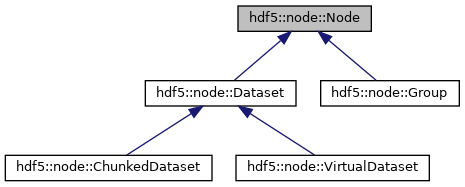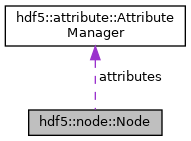#include <node.hpp>
◆ Node() [1/3]
- Parameters
-
| handle | rvalue reference to a handle instance |
| link | the path to the node |
◆ Node() [2/3]
| hdf5::node::Node::Node |
( |
| ) |
|
In order to store objects in a container like a std::vector they must be default constructible. A default constructed object cannot be used for anything. Use the is_valid() function to check whether or not a Node instance refers to a valid HDF5 object or not.
- See also
- is_valid()
◆ Node() [3/3]
| hdf5::node::Node::Node |
( |
const Node & |
| ) |
|
We use the default implementation
◆ ~Node()
| virtual hdf5::node::Node::~Node |
( |
| ) |
|
|
virtual |
Must be virtual as we want to derive child classes from here.
◆ close()
| void hdf5::node::Node::close |
( |
| ) |
|
Closes the node object and renders the node instance as invalid.
◆ id()
Return the unique ID of an object. This identifier must not be confused with an HDF5 handle (called hid_t in the C-API. This ID identifies an object uniquely within a program context.
- Returns
- instance of ObjectId
◆ is_valid()
| bool hdf5::node::Node::is_valid |
( |
| ) |
const |
◆ link()
| const Link & hdf5::node::Node::link |
( |
| ) |
const |
This returns the link which was used to access the node.
◆ operator hid_t()
| hdf5::node::Node::operator hid_t |
( |
| ) |
const |
|
inlineexplicit |
◆ operator=()
| Node & hdf5::node::Node::operator= |
( |
const Node & |
node | ) |
|
◆ type()
| NodeType hdf5::node::Node::type |
( |
| ) |
const |
◆ attributes
The documentation for this class was generated from the following file:
- /home/p00user/src/src/h5cpp/node/node.hpp

